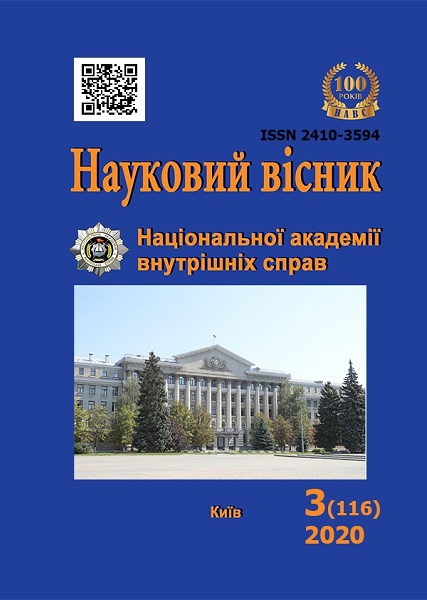Evasion of the Payment of a Single Contribution to Compulsory State Social Insurance and Insurance Contributions to Compulsory State Pension Insurance in the System of Tax Crimes
Abstract
The purpose of the publication is a criminal analysis of tax evasion of a single contribution to compulsory state social insurance and insurance contributions to compulsory state pension insurance as fiscal crimes. Methodology.
The article used a complex of scientific methods, namely: terminological, historical and legal, system-structural, formal-logical, comparative legal. Scientific novelty. Based on a legal analysis of Article 212-1 of the Criminal Code of Ukraine, objective and subjective signs of a crime are revealed, highlighting the main characteristics of this act for the proper qualification of the offense and ensuring proper evidence on the relevant criminal proceedings. When establishing the objective side of the crime under Art. 212-1 of the Criminal Code of Ukraine, the act itself, its socially dangerous consequences, as well as the causal relationship between this act and the consequences are subject to proof. Attention is drawn to regulatory documents in the field of taxation, pensions, wages, which disclose in detail the subject of tax evasion of single contributions and insurance contributions, methods of committing and concealing a crime, as well as signs of the subject of the corresponding criminal offense. Conclusions. The main purpose of the punishment for a crime under Art. 212-1 of the Criminal Code of Ukraine, is the return of contributions not received by the budget due to illegal activities. The norms of this article have a preventive effect. Criminal prosecution under such conditions is not effective, especially taking into account the time and labor, financial resources for appeal procedures against decisions of fiscal and law enforcement agencies in the criminal proceedings on evasion of payment of a single contribution for compulsory state social insurance and insurance premiums for compulsory state pension insurance.
Keywords: single contribution; insurance fee; tax crime; evasion; single contribution to compulsory state social insurance; insurance premiums for compulsory state pension insurance.
Downloads
References
Baier F. J. Foreign Direct Investment and Tax: OECD Gravity Modelling in a World with International Financial Institutions. Athens Journal of Business & Economics. 2020. Vol. 6. Issue 1. Р. 45–72. doi: https://doi.org/10.30958/ajbe.6-1-3.
Біловус Т. Недержавний пенсійний фонд як суб’єкт ринку цінних паперів. Проблеми і перспективи економіки та управління. 2019. № 2 (18). С. 261–270. doi: 10.25140/2411-5215-2019-2(18)-261-270.
Брич Л. П., Навроцький В. О. Кримінально-правова кваліфікація ухилення від оподаткування в Україні : монографія. Київ : Атіка, 2000. 287 с.
Науково-практичний коментар Кримінального кодексу України : за заг. ред. О. М. Джужі, А. В. Савченка, В. В. Чернєя. Київ : Юрінком Інтер, 2018. 1346 с.
Филиппов Д. И. Финансовые инновации в условиях развития цифровой экономики. Креативная экономика. 2019. Т. 13. № 8. С. 1503–1520. doi: 10.18334/ce.13.8.40881.
Грабовська Г. М., Заїка В. П. Накопичувальна пенсійна система як складова недержавного пенсійного фонду. Молодий вчений. 2020. № 1 (77). С. 21–25. doi: https://doi.org/10.32839/2304-5809/2020-1-77-5.
Гумін О. М., Дучимінська Л. М. Пенсійний Фонд України як суб’єкт запобігання злочинам. Кримінологічна теорія і практика: досвід, проблеми сьогодення та шляхи їх вирішення : матеріали міжвузів. наук.-практ. круглого столу (Київ, 22 берез. 2019 р.) / [редкол.: В. В. Чернєй, С. Д. Гусарєв, С. С. Чернявський та ін.].
Київ : Нац. акад. внутр. справ, 2019. С. 24–25. URL: http://elar.naiau.kiev.ua/bitstream/123456789/13853/1/%d0%9a%d0%a0%d0%98%d0%9c%d0%86%d0%9d%d0%9e%d0%9b%d0%9e%d0%93%d0%86%d0%a7%d0%9d%d0%90%20%d0%a2%d0%95%d0%9e%d0%a0%d0%86%d0%af%20%d0%86%20%d0%9f%d0%a0%d0%90%d0%9a%d0%a2%d0%98%d0%9a%d0%90_p025-027.pdf.
Kemme D. M., Parikh B., Steigner T. Tax Morale and International Tax Evasion. Journal of World Business. 2020. Vol. 55. Issue 3. doi: https://doi.org/10.1016/j.jwb.2019.101052.
Кримінальний кодекс України : Закон України від 5 квіт. 2001 р. № 2341-III. URL: https://zakon.rada.gov.ua/ laws/show/2341-14.
Matos T., Macedo J. A., Lettich F., Monteiro J. M., Renso C., Perego R., Nardini F. M. Leveraging feature selection to detect potential tax fraudsters. Expert Systems with Applications. 2020. Vol. 145. P. 113–128. doi: https://doi.org/10.1016/j.eswa.2019.113128.
Орешкин М. И., Сутурин М. А. К вопросу о либерализации уголовной ответственности за преступления в сфере экономической деятельности. Уголовная юстиция. 2019. № 13. С. 48–51. doi: 10.17223/23088451/13/9.
Основи законодавства України про загальнообов’язкове державне соціальне страхування : Закон України від 14 січ. 1998 р. № 16/98-ВР. URL: https://zakon.rada.gov.ua/laws/show/16/98-%D0%B2%D1%80/ed20151228.
Звіти Державної податкової служби України. Державна податкова служба України : [офіц. сайт]. URL: https://www.tax.gov.ua/diyalnist-/plani-ta-zviti-roboti-/396505.html.
Abstract views: 412 PDF Downloads: 456
- Authors reserve the right to authorship of their own work and transfer to the magazine the right of the first publication of this work under the terms of the Creative Commons Attribution License, which allows other persons to freely distribute published work with mandatory reference to authors of the original work and the first publication of an article in this magazine.
- Authors have the right to enter into separate additional agreements on non-exclusive dissemination of the work in the form in which it was published in the journal (for example, to post an article in the institution's repository or to publish as part of a monograph), provided that the link to the first publication of the work in this journal is maintained.
- The journal's policy allows and encourages the posting of articles by authors on the Internet (for example, in electronic storehouses of institutions or on personal websites), both before the submission of this manuscript to the editorial office and during its editorial processing, as this contributes to the creation of a productive scientific discussion and positively affects the efficiency and dynamics of citing the published work.




